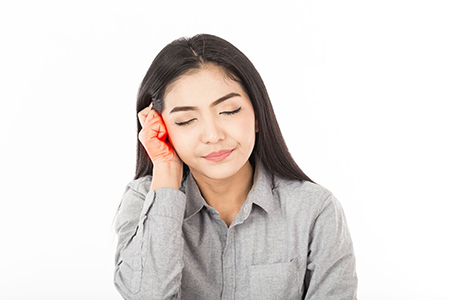Make an Appointment
Just fill out the form below to make an appointment to get help from our qualified staff of doctors. It's easy and fast.
Ear Ache:
Ear ache, or ‘otalgia’ to use its medical term, is a common patient complaint, and one that brings many patients to their GP or an Ear Nose & Throat surgeon. In children, ear ache ranks as one of the leading complaints evaluated in the primary care or emergency setting.
It of course comes in many forms, both in terms of the quality of the ‘ache’ and the underlying cause. And whilst most commonly, the causes are not serious, and easily treatable, rarely the causes are more serious or life-threatening, and may be more involved in their investigation and treatment.
The most common causes are: Acute Middle ear infection (Acute otitis media), Acute external ear canal infection (Acute otitis externa), and a Glue Ear (Otitis media effusion). These are all known as ‘primary’ otalgia, as the pain is truly coming from the ear. Other ear related causes of ear-ache include infections, inflammation and injury of the outer, visible, cartilaginous part of the ear (auricle).
Interestingly, not all ‘ear’ pain, is truly from the ear! Whilst the symptom may very much be centred ‘in the ear’ the actual cause could be from a structure nearby the ear, such as the teeth, Jaw joint, parotid gland, lymph nodes, and scalp skin, etc. or even from a structure nowhere near the ear such as the mouth, back of the throat, voice-box, or even down the oesophagus. Such distant causes of ear pain are known as ‘referred’ otalgia, as the pain is ‘referred’ from the actual site of pain, by nerves and the brain, to be ‘felt’ by the patient in the ear, even though the ear is completely normal.
 During an assessment, especially in adult patients where the ear pain is only on one side, and has been there for some time, your physician will be very careful to rule out these other ‘hidden’ causes, especially if the pain persists after an initial course of antibiotics or pain killers, or other simple therapies.
During an assessment, especially in adult patients where the ear pain is only on one side, and has been there for some time, your physician will be very careful to rule out these other ‘hidden’ causes, especially if the pain persists after an initial course of antibiotics or pain killers, or other simple therapies.
Your GP or ENT will perform a thorough history and examination of the ear, nose, head and neck, and throat examination. If the initial evaluation doesn’t reveal the cause of ear ache, then a flexible camera examination of your airway and throat, by an ENT surgeon may be required, along with further tests such as hearing tests, blood tests, CT scans, or MRIs.
Many people don’t realise how truly intrusive and sore an earache can be until they experience it for themselves. So, good pain relief is a key part of initial treatment.
In addition to simple pain relief, in children, most causes of ear ache are also treated with antibiotics, either taken orally (mouth), or as drops in the ear canal itself.
Treatments for other conditions are highly varied, depending on the underlying cause. Some useful information be found in the following links: Acute Otitis Media, Otitis Externa, Glue Ear, Temporo-mandibular Joint dysfunction.
Remember, any ear ache persisting for more than 2 weeks should be evaluated by your local GP.
Blocked Ears:
 A feeling of a blocked ear, or aural fullness, is a common complaint, especially in older children or adults.
A feeling of a blocked ear, or aural fullness, is a common complaint, especially in older children or adults.
Sometimes it truly is literally a ‘blocked’ ear. The ear canal can be obstructed by wax, discharge from infection or injury, or sometimes a foreign body (such as a bead in children, or the end of a hearing aid in older patients), and it is the sense of mild pressure & discomfort that is the cause for the feeling of fullness. If this is the isolated cause, then careful removal without causing trauma will likely instantly resolve the symptom. This can often be performed by the GP, but sometimes needs the additional instrumentation and expertise of an ENT surgeon to carefully remove the ‘offending’ object, especially if its right up against the eardrum.
However, sometimes, when a patient complains of a blocked ear, the ear canal is completely clear, and the ear drum can be seen. In these cases, the feeling of blockage may actually be related to a decline in hearing (whether sudden or slow onset) in the effected ear. In these cases you GP or ENT surgeon will organise a hearing test looking for some form of hearing loss to explain your symptoms. Further details on hearing loss can be found here.
Lastly, sometimes the blocked feeling can occur despite an essentially normal looking ear, and a normal hearing test. It can be frustrating for the patient, as they are told ‘everything is normal’, despite having a symptom that can be quite intrusive and troublesome at times.
Whilst this is uncommon, such a feeling of blockage or fullness may then be related to conditions such as meniere’s disease, migraine, or even eustachian tube dysfunction.